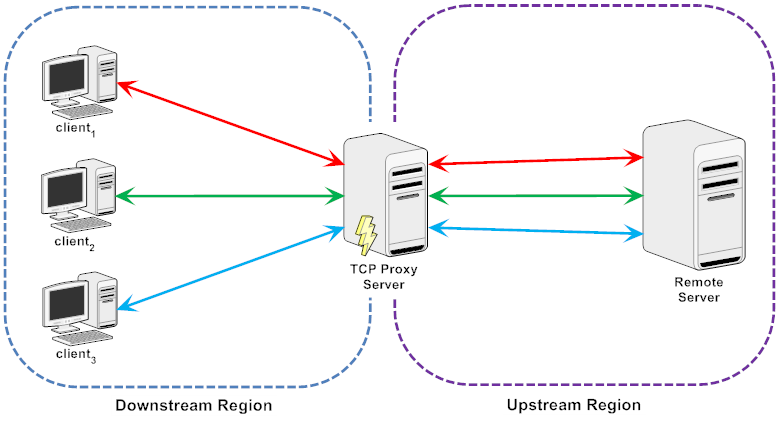The C++ TCP Proxy Server Variations are a series of very simple variations made upon the baseline version of the C++ TCP Proxy server so as to demonstrate how one can easily add interesting and useful functionality to the proxy server and also to provide a simple tutorial on the usage of the ASIO library. The variations presented are as follows:
- Multi-threaded I/O service
- Limiting of upstream data flow
- Logging of upstream and downstream data flows
- Limiting the number of concurrent client connections
Free use of the C++ TCP Proxy Server variations is permitted under the guidelines and in accordance with the MIT License.
http://www.opensource.org/licenses/MIT
All updates and the most recent version of the C++ TCP Proxy Server variations can be found at: http://www.partow.net/programming/tcpproxy/index.html
Code repository: https://github.com/ArashPartow/tcpproxy-variations
- For a complete build: make clean all
- To strip executables: make strip_bin
- GNU Compiler Collection (4.3+)
- Intel® C++ Compiler (9.x+)
- Clang/LLVM (1.1+)
- Microsoft Visual Studio C++ Compiler (8.1+)
- Linux : tcpproxy_server_linux_binaries.zip
- Windows : tcpproxy_server_win32_binaries.zip
A simple scenario is as follows:
There exists a server at 192.168.0.100 that accepts connections on port 20000, however due to firewall rules external clients can only access a host at 192.168.20.200 on port 8080 (eth0), which coincidentally has access to the 192.168.0 network segment via a second NIC (eth1). A solution for allowing the external clients access to the server is to run the TCP proxy server on the host at 192.168.0.200 with the following configuration:
tcpproxy_server 192.168.20.200 8080 192.168.0.100 20000The above command when run upon the proxy machine at 192.168.20.200, will bind to port 8080 on eth0 in order to accept connections from external clients - which presumbly will originate from the firewall. Upon a new client connecting, the proxy will make a connection on behalf of the client to the server residing at 192.168.0.100 on port 20000 via eth1, and then proceed to send all incoming data from the client to the server and vice versa. Once either party (client or server) disconnects, the proxy will immediately disconnect the other party.
